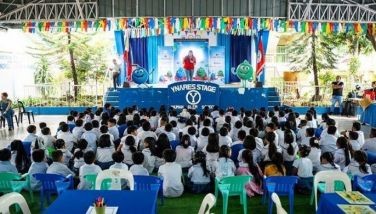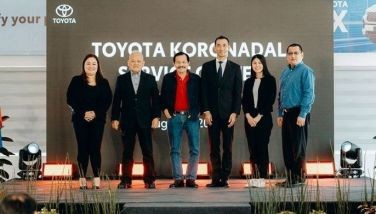Asymmetric self-defense

TAIPEI – Last Monday evening, the lines waiting to go up to Taiwan’s iconic Taipei 101 were long as usual.
And at nearby Din Tai Fung restaurant, renowned for its delectable xiao long bao, the waiting time for dine-in with no reservation was an hour, with even the function rooms for big groups fully booked.
The adjoining food court was packed with people as usual, many of them foreigners.
Taiwan received 6.5 million foreign visitors last year (the Philippines received 5.45 million), and is aiming for 10 million for 2024. This is down from the original 12 million, adjusted after China discouraged its citizens from traveling to Taiwan.
Despite intensifying Chinese military intimidation activities around Taiwan, which Beijing considers a renegade province, I haven’t noticed any heightened concern among residents here in comparison with my earlier visits pre-pandemic and last year.
“Everything’s just the same in Taiwan,” Shih-yin Huang of the Tourism Administration’s International Affairs Division told foreign journalists here last Monday when asked if China’s saber-rattling was altering Taipei’s tourism projections.
The COVID pandemic, Huang told us, had greater negative impact on Taiwan’s tourism than China’s belligerent acts.
* * *
This doesn’t mean, of course, that Taiwan is taking the Chinese threat for granted. Beijing has openly warned that it intends to reunite with Taiwan, and retake the self-ruled island by force if necessary.
Senior US military officials believe China could invade Taiwan as early as 2027. Last April, the former commander of the US Indo-Pacific Command, Adm. John Aquilino, echoed this assessment, saying China would have this capability by 2027. Whether Beijing would have the interest to do so remains to be seen.
Catherine Hsu, director general of the Department of International Information Services at the Ministry of Foreign Affairs, narrated this story to illustrate the attitude of the typical Taiwanese for the past seven decades: a woman doing her morning exercises was asked to comment on the possibility of a Chinese invasion. The woman’s reply, according to Hsu: “If the day comes, it comes.”
For Taipei, it’s not a completely “what, me worry?” stance. While the Taiwanese go on with business as usual, they are fortifying their defenses.
Last Sunday at the centennial rites of the Republic of China Military Academy (also called Whampoa) in Kaohsiung, new Taiwan President William Lai urged the students and alumni to resist defeatism, to unite and be prepared to make sacrifices to defend national sovereignty.
This defeatism springs from a warning, believed fomented by pro-China elements, that Beijing’s strategy would be to mount such a rapid, massive invasion that the US would have no time to come to the rescue of Taiwan – that the first battle would be the last.
The Philippines has similar elements warning that the country cannot survive an attack by the Chinese, so why not just kowtow to Beijing and give them all the territory they want?
* * *
Beyond urging his compatriots not to give in to a defeatist narrative propagated by China, Lai is leading Taiwan in bolstering self-defense capability and preparing for asymmetric warfare against a superior force.
For example, Taiwan has included drone development in its military buildup program. The island, whose economy has thrived on high-tech innovation, is not scared of embracing technology, including artificial intelligence.
AI is spooking even the global tech leaders, but not Taiwan’s Ministry of National Defense. It intends to obtain this year 968 medium and large-sized military and attack drones equipped with AI and machine learning capability, to boost sea and air combat power. The MND already has over 2,000 military drones.
Taiwan wants to be “an AI island,” Hsu told us.
The drones will be developed by the MND’s Armaments Bureau through its Chungshan Institute of Science and Technology. Commercial drones for use by Taiwan’s military will also be produced by private contractors.
Hsu stressed that help from its allies led by the US is always welcome. “We think the US is a very, very close partner,” she said, “(but) first we want to encourage our people to show determination to defend ourselves.”
“We can’t expect foreign aid before we show our determination,” she said, adding that the Taiwanese should learn lessons from Russia’s invasion of Ukraine.
Taiwanese people, Hsu said, have prepared themselves not only psychologically but also militarily and in other ways to defend themselves as China engages in hybrid warfare and employs gray zone tactics to advance its strategic interests.
Although constantly preparing for the worst, and despite China’s saber-rattling following the election of a president that Beijing considers to be pro-Taiwan independence, Hsu downplays the threat of armed conflict.
“We don’t think war is inevitable. We don’t think war is unavoidable,” she told us. “We just want to prevent the worst from happening.”
* * *
Even a Chinese blockade would be risky for Beijing, Hsu pointed out, as it would disrupt not only the Taiwanese economy but also the global supply chain. Taiwan is a top producer of high-tech electronic components and similar items needed by major companies such as Apple.
Hsu said there is no reason for Beijing to believe President Lai will be ramping up moves to declare Taiwan independence.
“Taiwan is already an independent country as far as we are concerned,” Hsu said. “There is no need for Taiwan to re-declare independence.”
She noted that Beijing might be referring to Lai’s remarks from many years ago, when he advocated for “pragmatic Taiwan independence.”
“Pragmatic means that he won’t provoke,” Hsu explained to us. “So, no, the new government is not more pro-independence.”
The Chinese, she said, “have to accept the reality that the Republic of China already exists.”
If the Taiwanese spent time worrying about a Chinese invasion, Hsu said, Taiwan would not have become the world’s 20th largest economy, with its people living in a free society.
This attitude was evident last Monday at the heart of Taipei, where I joined the crowds in stuffing my face with xiao long bao, from the signature version to the desserts with taro and chocolate filling plus the salted egg custard bun.
With food like that, it’s hard to fret about a Chinese invasion.
- Latest
- Trending


























